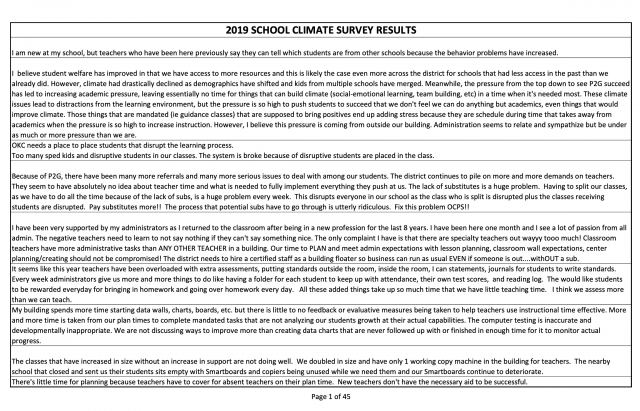
I’ve read school climate surveys and listened to teachers for decades. In my experience, most educators hold their frustration in — until they can’t take it anymore. I thought morale bottomed out in Oklahoma City Public Schools under former Superintendent Aurora Lora, before the recent statewide teacher pay raises, when the American Federation of Teachers’ OKCPS teacher survey prompted 291 comments in 2017. However, I’ve never read anything like the AFT’s November 2019 survey.
Among survey respondents, the only thing which prompted more scathing criticism than this year’s Pathway to Greatness (P2G) district realignment was the increase in disorder and violence. Only 11 percent of respondents said that “Student welfare and school climate has improved.” Twenty-five percent said their site has received “trade ups,” but 38 percent said their class size increased after P2G closed schools and realigned feeder patterns.
Eighty-eight percent reported disruptions of the learning environment, with 50 percent reporting distractions due to wireless devices, 43 percent reporting bullying, and 19 percent reporting “assault and battery against school personnel.” Moreover, 47 percent added comments.
My reading of about 373 teacher comments this year was that fewer than 2 percent were positive about P2G and fewer than 4 percent had mixed feelings. Except for a couple of elementary teachers who said their jobs are easier without fifth graders, nobody said anything good about sending those students to middle schools.
Every one of the 45 pages of comments included concerns about violence and chronic disorder, and the clear majority of complaints involved P2G in middle schools. One described students being returned to class 10 minutes after a fight, with one having a bloody nose. A service provider who works at two middle schools noted that one was “great,” but the other was “out of control.” An instructional coach said, “Some teachers are dealing with out-of-control student behaviors all day long.”
Some teachers said their principals are trying to provide support, but that often means that kids with discipline problems hang out in the offices or walk the halls. One described hallways as full of “defiance, pandemonium and nonsense.” A common theme was that teachers feel they are essentially told, “Welcome to middle school,” where “chaos” happens.
Another common comment was that some administrators turn a blind eye to the ways that schools have spun out of control. Many echoed a statement that discussed “the rigid, unrelenting, and stifling criteria which seems to be mandated by the upper echelon of administrators.”
A worrisome number of teachers said the blame game was being ramped up by creating a climate “full of fear and animosity” which students see and “feed off.” One said, “It’s appalling to see the way the staff are talked about and treated,” and students see the way the people at the top treat their teachers, so “unhappy teachers make unhappy students.” Another worried that “students are noticing more and more morale issues among staff,” causing student morale to decline.
‘I am afraid I have lost all faith’
Commenters noted that the stress is affecting both students and teachers. A grandmother complained about her bullied fifth grader and how the child is “getting physically sick thinking about going to school.” She said she has 30 years of experience in the OKCPS, but “I am afraid I have lost all faith in the decisions of the district.”
Although such complaints were more poignant than the concerns of previous years, they were not unexpected. Even though I have previously worried about the way I believe P2G overreached, I hadn’t anticipated how the district has apparently continued to place impossible mandates on its staff, which one teacher dubbed, “minutia of paperwork.”
By 2017, it had seemed like the teachers’ backlash against benchmark testing and the district’s instructional coaching would prompt cutbacks in those discredited tactics. But if these commenters are correct, the district is struggling to implement a litany of administrative efforts, including:
- Istation testing
- Benchmark Literacy
- Singapore Math
- ReadWorks
- Expanded Summit Learning
- Tighter “Professional Learning Community” ground rules, with data tracking, success criteria, Kagan strategies, anchor charts, assignments for reteaching activities, and small group reading lessons plans
- Snapshots and the PLC Unit Formation and Summatives
- Professional Learning Goals
- “Book studies, Mastery Connect, detailed notes required from weekly and monthly meetings, [that] all have to be uploaded to the Google drive”
- More time “starting data walls, charts, boards, etc.”
- Monthly testing of 5-year-olds on i-pads
- Evolving benchmark testing and power standards, and a 2-month lesson plan calendar
- 2nd Step
- The loading of “this app or that app on our phone to use with students”
- The continuation of Marzano teacher evaluations.
Marzano evaluations have long been ridiculed, but now teachers in the 2019 AFT survey have complained about visits from as many as five to seven administrators at a time. One commenter also panned “committee” meetings, in addition to staff meetings, that regularly require travel across town. And given a lack of substitutes, teachers said they have to cover for each others’ classes.
Another educator commented, “At convocation, Dr. McDaniel told us we would be shifting from a culture of compliance to one of service.” However, “our ILD and principal have become more focused on compliance.” Rather than take tasks off the plates of overworked educators, the commenter said, they are creating a “hostile environment with multiple teachers ending up in tears (…) due, in large part to our administration caring only about what level students are on in Istation.”
Leaders respond to teacher complaints
After his organization’s 2019 was released, OKC-AFT President Ed Allen issued a statement.
“Frustration is sky high and teachers are rightfully asking for help in ending the madness,” Allen said. “Teachers are clearly saying student behavior, constant testing and lack of time to prepare/teach are the issues. Leadership however, seems to view instructional support as more important. Two separate views and a recipe for disaster.”
OKCPS Superintendent Sean McDaniel also issued a statement.
“District leaders are closely examining the survey data, along with the feedback we regularly gather directly from our valued educators via my Teacher Advisory Committee, our school site visits, and other one-on-one interactions with OKCPS staff,” McDaniel said. “We deeply appreciate our partnership with Mr. Allen and his team at AFT, and I look forward to working closely with them in the days ahead.”
When a moderate like Ed Allen uses the word “disaster,” the district should take note. If the superintendent listens closely to teachers, I hope he will realize that the success — both perceptual and actual — of P2G is seriously at risk if he and his team can’t find ways to take other, mostly annoying tasks off their teachers’ plates.
2019 OKC-AFT survey comments from OKCPS teachers
https://nondoc.com/wp-content/uploads/2020/02/2019-AFT-Climate-Survey-Comments.pdf” height=”450px” download=”all”]2019 OKC-AFT survey data from OKCPS teachers
https://nondoc.com/wp-content/uploads/2020/02/AFT-Climate-Survey-Statistical-Analysis-2019-1.pdf” height=”450px” download=”all”]





















